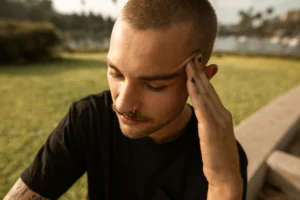Benzo Rehab and Treatment
Begin your journey toward recovery today with our benzo rehab program, designed to support those struggling with benzodiazepine dependence and addiction. At Cornerstone Healing Center, we provide treatment that helps you reclaim a life free from addiction and guides you through each step with personalized care.
Check your insurance coverage

Our Benzo Rehab in Scottsdale and Phoenix, Arizona
At Cornerstone Healing Center in Scottsdale and Phoenix, we’re here to provide compassionate, personalized support for those facing the challenges of benzo addiction.
Our substance use disorder program brings together individual therapy, group sessions, family support, and holistic care to help you heal in both mind and body. In a welcoming, non-judgmental space, our dedicated team is here to guide you toward breaking free from addiction and reclaiming a fulfilling life. If you’re ready to take that first step, reach out to learn about our Arizona treatment program and start your journey to recovery. Please keep in mind that placement depends on level of care, location, and your needs.
Understanding Benzo Addiction
What is Benzo Addiction
What Causes Benzodiazepine Addiction
The Symptoms of Benzo Addiction
Benzodiazepine Use Disorder is a form of substance use disorder marked by problematic use of benzodiazepine medications, commonly referred to as “benzos.” These central nervous system depressants, including medications like Xanax, Valium, Klonopin, and Ativan, are often prescribed for anxiety, insomnia, and seizures.
Benzodiazepine Use Disorder, as described in the DSM-5, involves patterns of benzo use that cause significant impairment or distress. This may include using benzos in larger amounts or for longer periods than intended, failed attempts to cut down, cravings, difficulty fulfilling obligations, and continued use despite harmful effects. Dependence with tolerance and withdrawal are also common features.
Benzodiazepine addiction often develops due to a combination of genetic, environmental, and psychological influences. Genetic factors, including certain genes, can increase the risk of benzo addiction.
Environmental aspects like easy access, social pressures, and exposure to stress or trauma can also contribute.
Psychologically, some individuals may turn to benzos to self-medicate untreated conditions like anxiety, depression, or insomnia. Those with mental health disorders or a history of substance use disorders are at a higher risk, as benzos can create dependency over time, leading the brain to rely on their effects for regular functioning.
Benzo addiction can show up in several ways, affecting behavior, physical health, and mental clarity. Common signs include:
- Behavioral Symptoms: Taking higher doses than prescribed, seeking multiple prescriptions, borrowing or stealing pills, and failed attempts to quit.
- Physical Symptoms: Drowsiness, dizziness, slurred speech, and withdrawal effects like anxiety, tremors, or seizures when stopping use.
- Cognitive Symptoms: Memory issues, confusion, and slower reaction times.
- Psychosocial Symptoms: Mood swings, anxiety, depression, relationship conflicts, and a drop in work or school performance.
When multiple symptoms appear together, it may indicate a struggle with Benzodiazepine Use Disorder.
Our Benzo Rehab Programs

Residential Programs
Our residential benzodiazepine rehab offers immersive, 24/7 care that combines psychotherapy, medication management, and holistic therapies. This structured setting addresses the underlying causes of benzo addiction and provides clients with essential coping tools, supporting a foundation for long-term recovery.

Outpatient Programs
Our outpatient benzo addiction treatment programs provide flexible, part-time therapy for those balancing daily responsibilities. With a focus on therapy, medication support, and lifestyle integration, our outpatient programs help individuals manage their benzodiazepine addiction while maintaining their routines.

Virtual IOP
Our Virtual Intensive Outpatient Program (IOP) offers a comprehensive treatment plan for benzodiazepine addiction. Through secure online access, clients receive individual therapy, group counseling, and valuable resources, making this an ideal choice for those who prefer or require the flexibility of remote care.
Our Phoenix and Scottsdale, AZ Treatment Locations
Our Arizona treatment centers offer convenient access to Scottsdale and Phoenix addiction treatment centers. With multiple locations, you’ll receive personalized care, and be connected with a strong support system throughout your recovery journey. Walk-ins are welcome at our Phoenix location.
Benefits of Benzo Rehab for Arizona Residents
Explore the distinctive benefits of our Arizona rehab, which is designed to facilitate transformative healing and sobriety.
Our Arizona benzodiazepine rehab center offers a supportive environment dedicated to fostering deep, lasting recovery. With a range of personalized therapies and holistic approaches, our program addresses the unique challenges of benzo addiction, helping clients find stability and renewed hope close to home.
Integrative Recovery Approach
Our program takes a whole-person approach to healing, focusing on physical, mental, and emotional recovery. We get to the root of addiction.
Dedication Clinical Team
Our dedicated team provides individualized, evidence-based care through one-on-one sessions, offering a safe place to heal and process.
Comprehensive Care
Our program emphasizes ongoing support tailored to each person’s unique path. You will be surrounded by people who understand you.
Broad Treatment Options
We offer various levels of care, creating flexible targetted treatment plans that cater to each individual’s needs and circumstances.
What to Expect
- An assessment of your individual needs and goals to create a personalized addiction rehabilitation plan.
- A treatment plan for mental health or co-occurring (or dual diagnosis) behavioral health conditions.
- Evidence-based therapies include cognitive behavioral therapy, dialectical behavior therapy, and trauma-informed care.
- Holistic approaches include yoga, meditation, art therapy, and music therapy
- Nutrition counseling and physical fitness activities for overall health and wellness.
- Family involvement in the recovery process through Common Ground or family sessions.
- Aftercare planning that includes relapse prevention strategies for long-term success in sobriety.
Client Family Testimonial
Meet Our Arizona Treatment Team
Meet our experienced masters-level treatment professionals passionately dedicated to providing compassionate, expert care in our state-of-the-art rehabilitation facilities and recovery centers in Scottsdale, AZ and Phoenix, AZ.
IOP Clinical Lead of Scottsdale
Lori Mischke, MSAC, LIAC
Lori Mischke, MSAC, LIAC, is a skilled clinical leader with over eight years of experience in behavioral health and substance use treatment. She holds a Master’s in Substance Abuse Counseling and is a board-certified clinical supervisor.
More About LoriClinical Director of Phoenix Program
Nate Bush, LCSW
Nate began his recovery journey in 2010 and earned a Master's in Social Work from ASU. He’s been in the Behavioral Health field since 2013. Specializing in CBT, DBT, and grief, Nate is now the Clinical Director of our Phoenix program, underlined by his passion for helping others who struggled with substance abuse issues as he did.
More About NateWhat are the signs of a benzo addiction?
Signs of benzo addiction include mood swings, memory issues, hostility, and noticeable fatigue. People may engage in risky behaviors, like driving under the influence, and may combine benzos with other substances. Other signs include seeking additional sources for benzos, vivid dreams, and short-term memory loss.
What are the side effects of a benzo addiction?
Benzos can have various side effects based on the length of use. Short-term effects may include memory issues, dizziness, dry mouth, and nausea. Long-term use can lead to more severe issues like anxiety, PTSD, depression, and sleep disorders. Since benzos affect the central nervous system, prolonged use can also impact mental health and physical well-being.
What prescription drugs are benzodiazepines?
Common benzodiazepines include:
- Xanax (Alprazolam)
- Ativan (Lorazepam)
- Valium (Diazepam)
- Klonopin (Clonazepam)
- Restoril (Temazepam)
These medications are often prescribed for anxiety, insomnia, and muscle relaxation.
How does benzo addiction happen?
Benzo addiction can develop with regular, long-term use due to the drug’s high dependency risk. Some people start with prescribed doses but increase them to achieve more sedation. Others may misuse it by crushing and snorting pills for a faster effect. Combined with other substances, this can lead to overdose.
How do I get a loved one to want to go to rehab?
When a loved one resists treatment, open conversations about the impact of their addiction can sometimes help. Show support without judgment and research treatment options together. Consulting addiction specialists may also encourage change. Remember to prioritize your well-being and seek support for yourself during this time.
Let's begin the journey together
Frequently Asked Questions
Knowledge base
Benzodiazepine Addiction
Get Started Now
Call and speak with one of our caring team members about help for you or a loved one.





